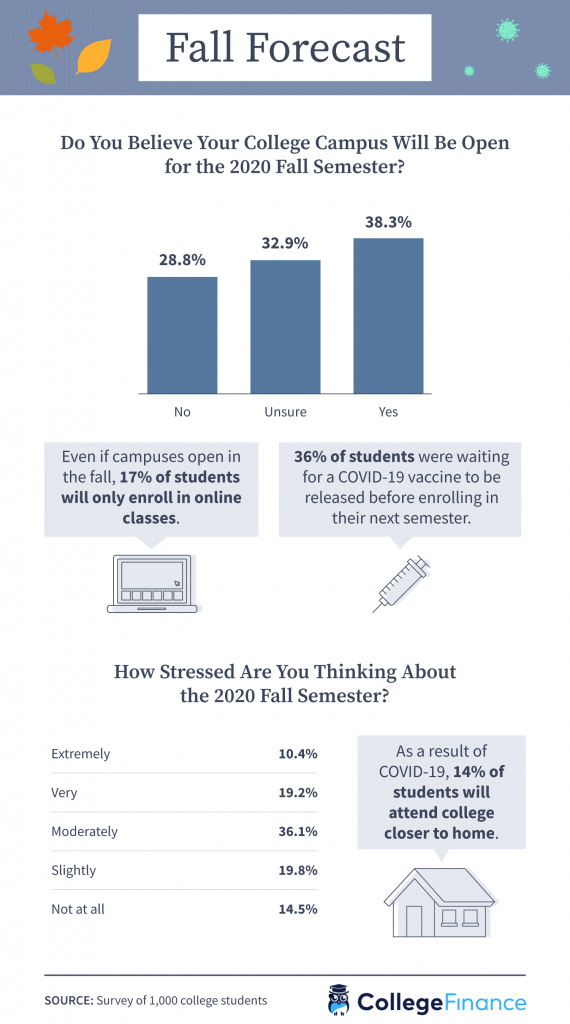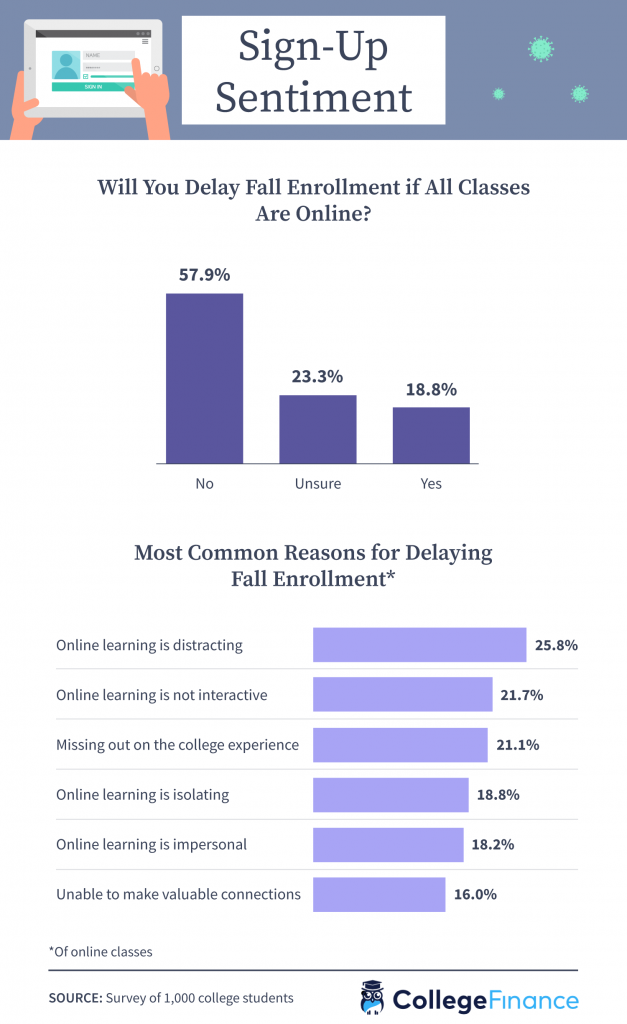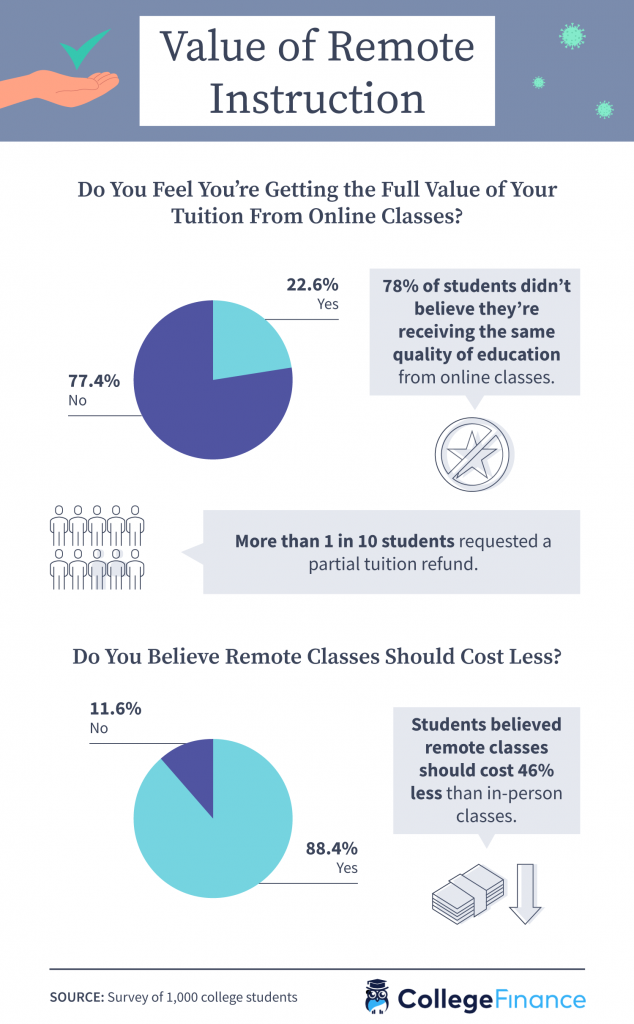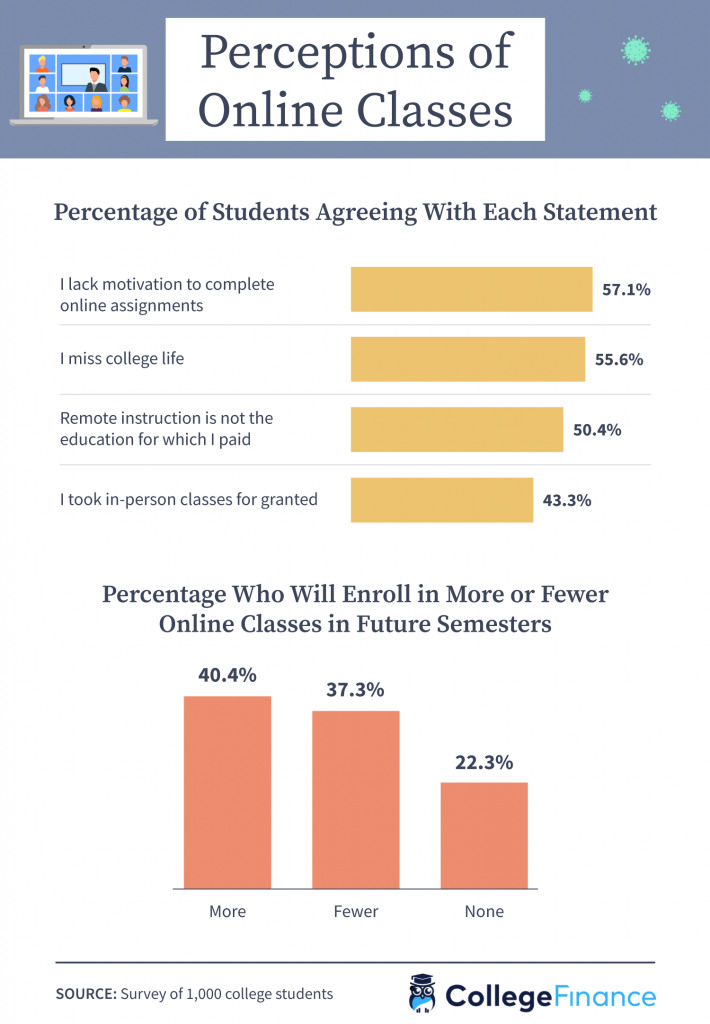Study Highlights
- Even if college campuses open in the fall, 17% of college students plan to enroll exclusively in online classes.
- Nearly 30% of college students are extremely or very stressed thinking about the 2020 fall semester.
- 14% of college students will enroll in a university closer to home.
- 36% of college students are waiting for a vaccine to be released before enrolling in their next semester.
- 77% of college students don’t believe they’re getting the full value of their tuition during the pandemic.
- More than 1 in 10 college students requested a partial tuition refund.
- 45% of college students are struggling to meet certain financial obligations during the pandemic.
There’s no denying that COVID-19 has changed the world. In the immediate crisis, the way we think about working, interacting with other people, or even just stepping outside our front door has been altered. As much as life with COVID-19 feels radically different than even the weeks or months before the virus evolved into a global health crisis, it’s even more difficult to imagine what life will be like after the pandemic has fully passed. For many, the financial impacts of the pandemic, especially for things like student loans, will likely continue for years.
While many analysts predict that the world will be forever changed by the impact and consequences of living with COVID-19, often referencing this altered reality as “the new normal,” millions of college students across the country are wondering what the world will look like for them as well.
Colleges and universities all around the U.S. canceled in-person spring classes as a result of the health crisis, but what happens when classes are expected to resume in the fall? For a closer look at how students are thinking and feeling about their new normal, we surveyed 1,000 currently enrolled college students for their perspective of COVID-19’s impact on their education. Read on as we explore how many expect their college campuses to be open at all, how many plan to exclusively take online classes in fall (even if in-person classes resume), and how they feel COVID-19 may have permanently changed their academic lives.
Perceptions of the 2020 Fall Semester
For many college students, the fall semester marks the beginning of a new school year – possibly even the beginning of their college journey altogether. In the past, students might spend the summer months thinking about which classes they’ll be taking, where they’ll be living, and looking forward to the year ahead. In 2020, with the impact of COVID-19 and the global health pandemic it’s sparked, some students may be wondering if they’ll have the option to go to college in the fall at all.

Of the 1,000 college students we surveyed, just 38% were confident their college campus will be open for the start of the 2020 fall semester. In contrast, 33% considered themselves unsure what the status of their college campus will be, and the other 29% expected their college campuses to be closed at the start of the term. Regardless of whether their schools open or not, many students are making their own plans for how to deal with academic life in the new normal. Even if their campuses are open, 17% of college students planned to enroll exclusively in online classes, and more than 1 in 3 students were waiting for a vaccine to become available before making the decision to enroll at all. After the pandemic has passed, 14% of students expected to attend a school that’s closer to home than the one they may have been going to or planning to attend before COVID-19.
As a result of the pandemic, 30% of college students acknowledged feeling extremely to very stressed about the upcoming fall semester, and another 56% identified feeling moderately or slightly stressed thinking about their classes and education. Fewer than 15% of college students identified not feeling at all stressed when thinking about the semester ahead.
The Future is Unclear
In a very short period of time, the entire higher education system seemed to shift from a model it had used successfully for decades to something almost completely digital. In the wake of the COVID-19 crisis, the academic landscape quickly adopted an online learning model where most (if not all) classes transitioned into remote instruction.

And while this may have worked as a short-term solution for students looking to finalize their spring semester classes, what happens if the fall semester (or beyond) continues to implement a model focused on online classes? While 58% of students wouldn’t delay enrollment if their college or university only offered online classes in the fall, nearly 1 in 5 college students would do so if their only option was remote learning, and another 23% were unsure.
Online classes may seem more flexible for students on the surface, but many have concerns about the long-term implications of not being able to attend classes in person. More than 1 in 4 students who planned to delay enrollment said they find online learning distracting, followed by those reporting it’s not interactive enough (22%) and those who believed they’ll be missing out on the college experience (21%).
Breaking Down the Value of Remote Instruction
The shift from college campus to college Zoom chats has left millions of students across the country feeling like they may not have gotten exactly what they paid for out of their spring semester.

More than 3 in 4 college students (78%) said they aren’t getting the same quality of education from online classes that they would have gotten if the semester hadn’t been uninterrupted, and more than 4 in 5 (88%) said remote or online classes should cost less than traditional courses. While many students have been looking to their institutions for at least some form of refund on the classes they enrolled in for the spring semester, they may be disappointed with the results.
Just because it feels like online classes should cost less doesn’t mean they actually do. In reality, schools are still paying their teachers and staff to operate in a digital capacity, and many are spending even more money to acquire the technology they need to support remote teaching and learning.
What Do Students Think of Online Classes?
Whether or not you agree with the idea that some students learn better with different teaching styles, many students have opinions about the environment in which they learn. More than anything else, 57% of students admitted they don’t have the motivation to complete online classes. More than half of college students also acknowledged they missed life on campus (56%) and that online classes simply weren’t what they paid for (50%). More than 2 in 5 college students also have come to feel they’d taken their in-person classes for granted.

Still, concerns around social distancing may be forcing students to think digitally about future semesters, whether they like it or not. While 37% said they’ll enroll in fewer online classes in the future, 40% of students expected to enroll in more online classes instead. Roughly 22% of students won’t be enrolling in online classes at all.
The Future of Higher Education
COVID-19 has disrupted so many ways of life for Americans, and the college experience is no exception. Not only have many classes migrated to an online or remote learning platform, but students are seriously considering only taking online classes for the fall semester or not enrolling in classes at all until a vaccine for COVID-19 is readily available.
At College Finance, we know this pandemic is having an impact on the way you think about your education and what to do next. Whether you have questions about what COVID-19 relief means for your student loans or you’re rethinking your borrowing strategy completely in the wake of this “new normal,” we have the resources you need to confidently navigate these complex situations. Learn more by visiting us online at CollegeFinance.com today.
Methodology and Limitations
We surveyed 1,000 college students about their perceptions of the 2020 fall semester and online classes. Of the 1,000 students surveyed, 39.8% identified as female, 59.7% identified as male, and less than 1% identified as nonbinary. The average age of respondents was 23 with a standard deviation of 5 years. An attention-check question was used to identify and disqualify respondents who failed to read questions and answers in their entirety. The main limitation of this study is the reliance on self-reported responses which are faced with myriad issues including, but not limited to, attribution, exaggeration, telescoping, and recency bias. The study was conducted on April 22, 2020.
Fair Use Statement
Are your readers thinking ahead to life after COVID-19? We welcome the sharing of this finding and the images in our report for any noncommercial use. Set a good example for students by including a link back to this page, so our team of contributors earn credit for their work.


